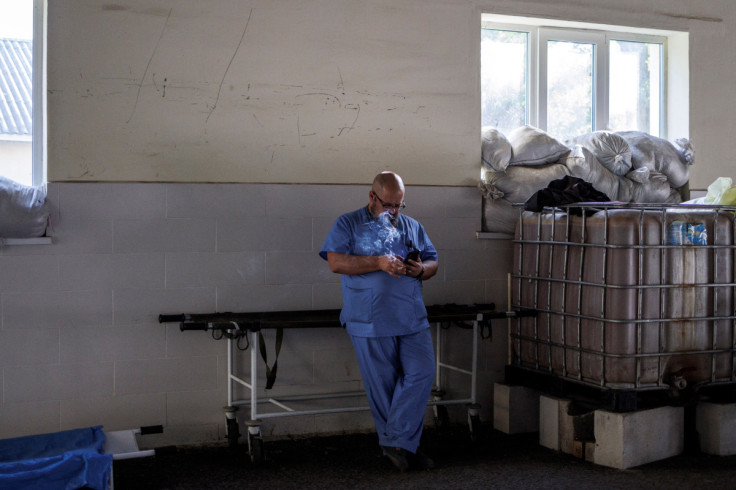Ukrainian Surgeons Continue Heart Surgery In The Dark Following Blackouts Due To Russian Attacks

KEY POINTS
- Surgeons at a hospital in Lviv, Ukraine, performed heart surgery in the dark
- Russian attacks on Ukrainian cities and infrastructure have left 10 million without power
- The Ukrainian government is "doing everything to normalize" the power supply
Doctors in Ukraine continued to carry out critical operations despite Russian attacks taking out power across the country.
In one case, surgeons at the Center for Children's Cardiology in the western Ukrainian city of Lviv were caught on camera proceeding with a heart surgery even after a Russian missile strike resulted in power being turned off.
"No time for blackouts," Ukraine's Ministry of Defense said in a post that included a photo of the scene.
No time for blackouts.
— Defense of Ukraine (@DefenceU) November 17, 2022
Surgeons of the Center for Children's Cardiology in Lviv continued heart surgery after the power was turned off due to a russian missile attack.
📷@MoH_Ukraine pic.twitter.com/8YFLL71Xa8
More than 10 million Ukrainians were left without power amid Russia's bombardment, Ukrainian President Volodymyr Zelensky said in a televised address Thursday.
Most of the affected were residents of Ukraine's Kyiv, Odesa, Vinnytsia and Sumy regions.
"We are doing everything to normalize the supply," Zelensky said.
Russian forces launched more than 100 missiles on Ukraine Tuesday in what the Ukrainian government claimed was the heaviest wave of missile strikes since Russia started its invasion in late February.
Russia's previous heaviest attack was on Oct. 10, which involved 84 projectiles.
Ukrainian air defenses were allegedly able to destroy 73 Russian cruise missiles, 10 Iranian-made Shahed drones and one Orion unmanned aerial vehicle (UAV) during the most recent bombardment.
Ukraine has received various air defense systems from several nations in the face of continued Russian strikes, including the National Advanced Surface-to-Air Missile System (NASAMS) from the United States, Aspide from Spain and IRIS-T from Germany.
Ukrainian Defense Minister Oleksii Reznikov announced the arrival of the first batch of NASAMS and Aspides in Ukraine on Nov. 7, while IRIS-Ts were delivered to the country last month.
The NASAMS has had a 100% success rate in Ukraine when it comes to intercepting Russian missiles, U.S. Defense Secretary Lloyd Austin said Wednesday.
Meanwhile, the lone IRIS-T that Ukraine had as of last month was able to shoot down nine out of 10 Russian missiles, Ukrainian Prime Minister Denys Shmyhal claimed at the time.
"These weapons will significantly strengthen [the Ukrainian Army] and will make our skies safer. We will continue to shoot down the enemy targets attacking us," Reznikov said.
The Ukrainian government is pressuring some of its supporters, the U.S., in particular, to provide more advanced equipment such as F-15 fighters and Patriot surface-to-air missiles as Russia stepped up its strikes on Ukraine's infrastructure, France24 reported.

© Copyright IBTimes 2025. All rights reserved.





















